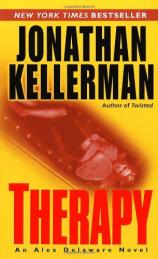Excerpt
Excerpt
Therapy

CHAPTER 1
A few years ago a psychopath burned down my house.
The night it happened, I was out to dinner with the woman who'd
designed the house and lived in it with me. We were driving up
Beverly Glen when the sirens cut through the darkness, ululating,
like coyote death wails.
The noise died quickly, indicating a nearby disaster, but there was
no reason to assume the worst. Unless you're the worst kind of
fatalist, you think: "Something lousy happened to some poor
devil."
That night, I learned different.
Since then, the Klaxon of an ambulance or a fire truck in my
neighborhood sets off something inside me—a crimp of
shoulder, a catch of breath, an arrhythmic flutter of the
plum-colored thing in my chest.
Pavlov was right.
I'm trained as a clinical psychologist, could do something about it
but have chosen not to. Sometimes anxiety makes me feel
alive.
When the sirens shrieked, Milo and I were having dinner at an
Italian place at the top of the Glen. It was ten-thirty on a cool
June night. The restaurant closes at eleven, but we were the last
patrons, and the waiter was looking tired. The woman I was now
seeing was teaching a night course in abnormal psychology at the
U., and Milo's partner, Rick Silverman, was busy at the
Cedars-Sinai ER trying to salvage the five most seriously injured
victims of a ten-car pileup on the Santa Monica Freeway.
Milo had just closed the file on a robbery-turned-to-multiple-
homicide at a liquor store on Pico Boulevard. The solve had taken
more persistence than brainwork. He was in a position to pick his
cases, and no new ones had crossed his desk.
I'd finally finished testifying at the seemingly endless
child-custody hearings waged by a famous director and his famous
actress wife. I'd begun the consult with some optimism. The
director had once been an actor, and both he and his ex knew how to
perform. Now, three years later, two kids who'd started out in
pretty good shape were basket cases living in France.
Milo and I chewed our way through focaccia and baby artichoke
salad, orrechiati stuffed with spinach, veal pounded to paper.
Neither of us felt like talking. A bottle of decent white wine
smoothed the silence. Both of us were strangely content; life
wasn't fair, but we'd done our jobs well.
When sirens came, I kept my eyes on my plate. Milo stopped eating.
The napkin he'd tucked in his shirt collar was spotted with spinach
and olive oil.
"Don't worry," he said. "Not a fire."
"Who's worrying?"
He pushed hair off his forehead, picked up his fork and knife,
speared, chewed, swallowed.
I said, "How can you tell?"
"That it's not a big-red? Trust me, Alex. It's a black-and-white. I
know the frequency."
A second cruiser wailed by. Then a third.
He pulled his tiny blue cell phone out of his pocket and punched a
button. A preset number rang.
I raised my eyebrows.
"Just curious," he said. His connection went through, and he told
the phone, "This is Lieutenant Sturgis. What call just went out in
the vicinity of upper Beverly Glen? Yeah, near Mulholland." He
waited, green eyes dimmed to near brown in the miserly light of the
restaurant. Under the spotted napkin was a baby blue polo shirt
that really didn't work well with his pallid complexion. His acne
pits were flagrant, his jowls gravid as freshly filled wineskins.
Long white sideburns frizzed his big face, a pair of skunkish
stripes that seemed to sprout artificially from his black hair.
He's a gay policeman and my best friend.
"That so," he said. "Any detective assigned, yet? Okay, listen, I
happen to be right near there, can make it over in ten—no
make that fifteen—make it twenty minutes. Yeah, yeah,
sure."
He snapped the little phone shut. "Double homicide, two bodies in a
car. Being this close, I figured I should have a look. The crime
scene's still being secured, and the techs haven't gotten there, so
we can still have dessert. How are you with cannoli?"
We split the check, and he offered to drive me home, but neither of
us took that seriously.
"In that case," he said, "we'll take the Seville."
I drove quickly. The crime scene was on the west side of the
intersection between the Glen and Mulholland, up a skinny,
decomposed, granite road marked private that climbed through
sycamore-crowned hillside.
A police cruiser was stationed at the mouth of the road. Staked to
a tree several feet up was a for sale sign bearing the logo of a
Westside Realtor. Milo flashed the badge to the uniform in the car,
and we drove through.
At the top of the road was a house behind high, night-blackened
hedges. Two more black-and-whites kept us ten yards back. We parked
and continued on foot. The sky was purplish, the air still bitter
with the smolder of two early-summer brush fires, one up near
Camarillo, the other past Tujunga. Both had just been vanquished.
One had been set by a fireman.
Behind the hedges was stout wooden fencing. Double gates had been
left open. The bodies slumped in a red Mustang convertible parked
on a semicircular flagstone driveway. The house behind the drive
was a vacant mansion, a big neo-Spanish thing that was probably
cheerful peach in the daylight. At this hour, it was putty
gray.
The driveway bordered a half acre of front yard, shaded by more
sycamores—giant ones. The house looked newish and was ruined
by too many weird-shaped windows, but someone had been smart enough
to spare the trees.
The top was down on the little red car. I stood back and watched as
Milo approached, careful to stay behind the tape. He did nothing
but stare. Moments later, a pair of crime-scene techs walked onto
the property lugging cases on a dolly. They talked to him briefly,
then slipped under the tape.
He walked back to the Seville. "Looks like gunshot wounds to both
heads, a guy and a girl, young. He's in the driver's seat, she's
next to him. His fly's open, and his shirt's half-unbuttoned. Her
shirt's clean off, tossed in the backseat along with her bra. Under
the shirt she wore black leggings. They're rolled down to her
ankles, and her legs are spread."
"Lover's lane thing?" I said.
"Empty house," he said. "Good neighborhood. Probably a nice view
from the backyard. Seize the night and all that? Sure."
"If they knew about the house, they could be locals."
"He looked clean-cut, well dressed. Yeah, I'd say local is also a
decent bet."
"I wonder why the gate was left open."
"Or maybe it wasn't, and one of them has some connection to the
house and a gate-clicker. For all we know, one of their families
built the place. Crime Scene will do their thing, hopefully they'll
find IDs in the pockets. The car's plates are being run right
now."
I said, "Any gun in sight?"
"A murder-suicide thing? Not likely."
He rubbed his face. His hand lingered at his mouth, tugged down his
lower lip and let it snap back up.
"What?" I said.
"Two head-shots plus, Alex. Someone jammed what looks to be a short
spear or a crossbow bolt into the girl's torso. Here." He touched a
spot under his breastbone. "From what I could see the damn thing
went clear through her and is lodged in the seat. The impact jolted
her body, she's lying funny."
"A spear."
"She was skewered, Alex. A bullet to the brain wasn't
enough."
"Overkill," I said. "A message. Were they actually making love or
were they positioned sexually?"
He flashed a frightening smile. "Now we're veering into your
territory."
Excerpted from THERAPY © Copyright 2004 by Jonathan
Kellerman. Reprinted with permission by Ballantine Books, a
division of Random House, Inc. All rights reserved.




